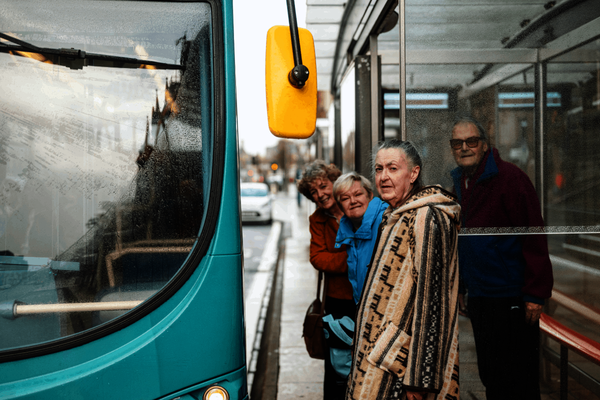Why being an Age-friendly Community is more important than ever

Find out why Age-friendly Communities are able to develop innovative responses to cost-of-living challenges.
At a time when investing in new projects can feel like a luxury, the Age-friendly Communities framework can be crucial.
Right now, life is increasingly difficult for many. Older adults, particularly those on a low income or in poor-quality homes, are among the hardest hit by the cost-of-living crisis. The Resolution Foundation, for example, predicts that people aged 75 and over will experience a sharper rise in the proportion of disposable income spent on energy than any other age group. But it's harder than ever for councils and communities to respond to this challenge, both with increasing costs and workloads, and impending budget cuts.
Age-friendly Communities are partnerships between the local council, older people and a wide range of organisations and sectors in a place. Amidst increasing pressure on communities, this approach encourages places to work in innovative ways to support residents to age well and live independently for longer, including during national crises. At a time when investing in new projects can feel like a luxury, we believe investing in partnerships is a necessity, and the World Health Organisation’s Age-friendly Communities framework outlines ways in which places can do that.
The Age-friendly Communities approach doesn’t always involve new money. Instead, communities often work differently to make the most of resources across their place and ensure older people’s voices are heard and embedded in community responses.
Age-friendly Communities join dots between partners, improving the crisis response for the most vulnerable older people
Through this connection, Age-friendly Communities can become more than the sum of their parts. In the cost-of-living crisis Age-friendly Communities have utilised their partnerships to ensure “warm spaces” that are set up meet the needs of older residents.
In South Tyneside, 56 organisations representing local authority, voluntary sector and business venues are hosting host warm spaces. The council are optimising the opportunity to signpost relevant support and services to older people by training staff in participating organisations on how to offer valuable information to visitors, including safeguarding and exploitation, fire safety, basic energy guidance and money and debt advice. Nationally, much of this information is only or largely provided digitally, including on how to access moneysaving deals. This is a significant barrier for the over 3 million people aged 55 and over who have never been online.
The Age-friendly Communities approach is fundamentally about connection – between different council departments, different sectors and different services.
Age-friendly Communities understand their communities, and can reach older people with timely and accessible information and resources
Across Northern Ireland, Age-friendly Communities have come together alongside the Public Health Agency and Age NI to offer keeping well advice in an innovative way through their Healthy Ageing Calendar. Each month provides different guidance on being physically active, staying warm and accessing financial support. The calendar is being distributed to over 50,000 older people in Northern Ireland.
In Age-friendly Torbay, staff and volunteers are signposting residents to services with their community helpline, 'One call, that’s all'. Torbay Community Foundation developed the helpline during the COVID-19 pandemic to match those in need with those offering help. Now, they have pivoted the helpline to respond to needs during the cost-of-living crisis, such as financial and mental health support.
In Age-friendly Communities the voice of older people is embedded throughout so we understand how best to get messages out and gather feedback on what the local issues are... for example in North Yorkshire a communications campaign is being planned about the cost of living and we have been approached to lead on messages for and reaching older people.
Age-friendly Communities can help put more money in the pockets of older people on low incomes
Across the country, Age-friendly Communities are running Pension Credit uptake campaigns. Strong partnerships across the community and a deep understanding of how best to communicate with older people locally saw the first phase of Greater Manchester’s Pension Top Up campaign generate over £3 million of additional income for older Greater Manchester residents. Not only does increasing Pension Credit uptake provide more money to older people, but we know that older people are most likely to spend money in the local economy, benefiting the wider community in the cost-of-living crisis.
In Hastings, they heard from older people that they often weren’t aware of the financial support available and struggled to apply using digital forms. The Council and Hasting Voluntary Action have responded by developing a Form Filling Friday initiative in partnership, offering face-to-face support for people to complete applications for council grants, rebates and other related forms.
In Age-friendly Communities, older adults provide important assets to respond to local challenges
We know that older adults are more likely to help out in their communities and Age-friendly Communities work to make sure older potential volunteers know about local opportunities and that the opportunities themselves are age-friendly and inclusive.
In order to ensure the experience of accessing warm spaces is positive and without stigma, Age-friendly Sunderland have recruited over 155 older volunteers to offer a warm welcome to users. Sunderland have been able to act quickly by building on their existing Ageing Well Ambassador Initiative, and through their knowledge of the community the Age-friendly lead has been able to directly match volunteers to warm spaces across the city.
In Manchester, Talking About My Generation’s older reporters' news team is amplifying the voice of older adults on cost-of-living issues. In their recent ‘What the F(inance)’ series, reporter Pauline questions how older people will cope with the storm of rising costs and which appliances are most energy efficient. Another writer, Lee, reflects how his favourite hobbies have become increasingly difficult to finance as the cost of necessities increases.
We know that our communities will always face challenges that need to be overcome, whether that’s COVID, cost-of-living or whatever the future brings. The Age-friendly Communities approach enables places to develop partnerships that build community resilience to deal with these ongoing challenges.
If you are an Age-friendly Community you can join the UK Network to share with others how you are responding, troubleshoot challenges and make the most of local opportunities.

